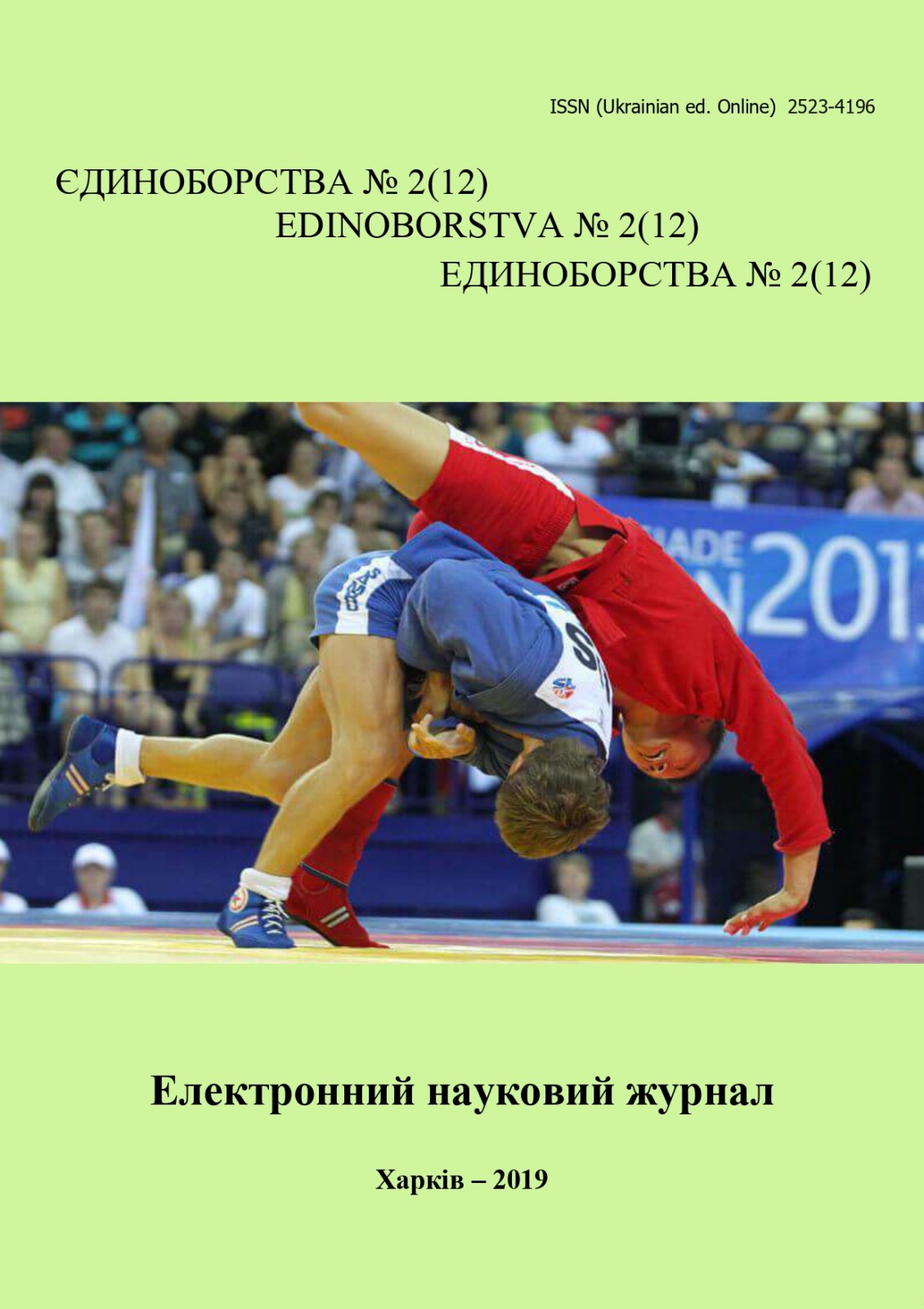Дослідження психологічних особливостей саморегуляції дзюдоїстів на початковому етапі підготовки
Ключові слова:
саморегуляція, індивідуальний стиль саморегуляції, психотренінг, дзюдоїстиАнотація
Мета: дослідити особливості індивідуального стилю саморегуляції дзюдоїстів на початковому етапі підготовки. Матеріал та методи. Психодіагностування дітей, які займаються боротьбою дзюдо, проводилось на базі спортивних закладів Івано-Франківської області. Загалом у дослідженні взяли участь 270 юних спортсменів (хлопчиків), віком 10-12 років. У роботі було використано теоретичні й практичні методи: аналіз науково-методичних джерел, спостереження, тестування (опитувальник В.І. Моросанової та Є.М. Коноз «Стиль саморегуляції поведінки - 98», опитувальни Р.І. Найдіффера «Стиль уваги та міжособистісного спілкування»); авторська психотренінгова програма, спрямована на підвищення саморегуляції дзюдоїстів на початковому етапі підготовки; методи математичної статистики. Результати: в особливостях саморегуляції дзюдоїстів виявляється насамперед те, як спортсмен планує та програмує досягнення поставленої мети, враховує зовнішні та внутрішні умови реалізації цих планів і програм, оцінює та корегує власні дії. За допомогою опитувальника «Стиль саморегуляції поведінки - 98» встановлено, що з 270 одноборців 69,63 % володіють низьким рівнем сформованості ауторегуляторної системи. Діагностування дзюдоїстів за опитувальником «Стиль уваги та міжособистісного спілкування» (адаптований Ю.Л. Ханіним) сприяло встановленню прямого кореляційного зв’язку між рівнем саморегуляції одноборців та вузького типу уваги (r=0,78, при р<0,01). Більшість спортсменів з високим рівнем сформованості саморегуляції схильні зосереджуватись на вирішенні важливих завдань діяльності. Профіль уваги респондентів з низьким рівнем ауторегуляторики зовнішньо перевантажений. Вони нездатні вирішувати проблеми щодо використання арсеналу техніко-тактичних засобів. Здійснюють помилки через те, що думають одночасно про декілька завдань. Не концентрують увагу на оцінюванні ситуацій навчально-тренувального та змагального процесів. Дослідження передбачало проведення формувального експерименту з використанням психологічного тренінгу. Адже нині саме він є однією з найбільш популярних форм групового виливу. Висновки. Отримані результати засвідчили, що в дзюдоїстів контрольної та експериментальної груп індивідуальний стиль саморегуляції суттєво відрізняється після проведеного психотренінгу. Відтак це дозволяє говорити про ефективність застосування різноманітних засобів психорегуляції у системі підготовки спортсменів вже на початковому етапі спортивної діяльності.
Посилання
Алексєєв, А. Ф., Ананченко, К. В., & Бойченко, Н. В. (2014). Теорія та методика викладання дзюдо та самбо: навч. посіб. для студенів 3 курсу (за кредитно-модульною системою). ХДАФК, Xарків.
Андреев, В. В. (2006). Индивидуальные особенности психологической защиты личности в спортивной деятельности (Автореф. дис. ... канд. психол. наук). СПб.
Бойченко, Н. В. (2007). «Пути повышения эффективности тренировочного процесса в восточных единоборствах». Физическое воспитание студентов творческих специальностей, 2, 148-150.
Ложкин, Г. В., & Колосов, А. Б. (2007). «Представления о методологии развития личности в спортивно-педагогической деятельности». Вісн. Нац. техн. ун-ту України «КПІ». Сер. Філософія. Психологія. Педагогіка. № 1., 81-90.
Моросанова, В. И., & Коноз, Е. М. (2010). «Стилевая саморегуляция поведения человека». Вопросы психологии, № 2, 118-127.
Тропин, Ю. Н., & Бойченко, Н. В. (2017). «Содержание различных сторон подготовки борцов». Единоборства, 79-83.
Afremow, J. (2014). «Sports Psychology: Training Your Brain to Win». Psych Central. Retrieved on November 11, from http://psychcentral.com/blog/archives/2013/12/02/sports-psychology-trainingyour-brain-to-win/
Chirazi, M. (2013). «Consequences of the new specifications of the judo regulations». Sport si Societate : Revista de Educatie Fizica, Sport si Stiinte Conexe. 13(2), 225-231.
Korobeynikov, G., Korobeinikova, L., Mytskan, B., Chernozub, A., & Wojciech, J. (2017). «Ido movement for culture». Journal of Martial Arts Anthropology, Vol. 17, № 2, 41–50.
Korobeynikov, G.V., Korobeynikova, L.G., Romanyuk, L.V., Dakal, N.A., & Danko G.V. (2017). «Relationship of psychophysiological characteristics with different levels of motivation in judo athletes of high qualification». Pedagogics, psychology, medical-biological problems of physical training and sports, 21, № 6, 272-278.
Kuryliuk, S. (2015). «Psychological preparation system of young judoists».Visn. Prikarpat. Univ., Ser. Fiz. Kult, 85-93.
Kuryluk, S. (2016). «Psyhological support for young judoka». Sport and society. Interdisciplinary journal of physical educational and sports. Volume 16, Issue 1, 89-96.
Manolachi, V., Marin, Ch., Daniel, R., & Mircea, I., (2010). «Judo - the alternative method of the contemporary education». Annals of the University Dunarea de Jos of Galati: Fascicle XV: Physical Education & Sport Management. Issue 2, 20-23.
Radochoński, M., Cynarski, W., Perenc, L., & Siorek-Maślanka, L. (2011). «Competitive Anxiety and Coping Strategies in Young Martial Arts and Track and Field Athletes». Journal of Human Kinetics, 27, 1640-5544.
Ziv, G., & Lidor, R. (2013). «Psychological Preparation of Competitive Judokas». Sports SciMed, 12(3), 371-380.













